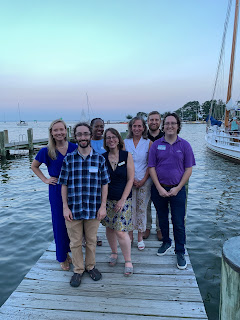The Interfaith Partners for the Chesapeake team by the Bay
Faithful
Stewards Caring for Sacred Waters
by
Natalie Johnson, M.A
People
of faith, no matter their religion, are united in one fundamental expression – love.
We are called to love people and all of Creation. Water is a matrix of
Creation, a ritual substance, and a gift from God intended to benefit all.
Through
water we are all connected. Our survival depends on clean water and it is
a necessity for all life on Earth. Water keeps us alive by quenching our
thirst, providing sustenance, recreation, and religious ritual practice
(christening, wudu, mikvah, etc.) We are often tempted to create and
maintain firm boundaries between old and new, humanity and the rest of
creation, between one another, as well as between the divine and ourselves.
However, just like water flows in between and through, we believe that
communities of faith can bring about a transformation of awareness and action
that reflects respect for our brothers and sisters in this watershed, and for
future generations.
Our
faith also calls us to foster healthy communities and be in relationship with
water in ways that contribute to healing and restoration. The way that we
treat water is a reflection of how we treat those around us, and we must bear
responsibility for it. This connects us with the golden rule common to
all major faith traditions - to love our neighbor and at Interfaith Partners
for the Chesapeake (IPC) we like to use the "Watershed Golden Rule"
of environmentalist Wendell Berry, "Do unto those downstream as you would
have those upstream do unto you." In doing so we are expressing our
faith and commitment to environmental justice.
Ethically,
fresh water is a substance that requires attention to justice: It is the poor
and vulnerable who are first and most profoundly affected by lack of
sufficient, clean, fresh water. In the Chesapeake Bay watershed, many
communities are exposed to pollution that place an unequal burden on the people
living there. Coastal and inland flooding also takes its hardest toll on
marginalized communities. In our context, God makes the rain, but we make the
runoff. Polluted stormwater runoff is the number one source of water pollution
that is increasing in local streams and waterways and eventually the Chesapeake
Bay. Development that increases the impervious surfaces on land creates
stormwater runoff that leads to water quality impairment. When rain falls on
roofs, streets, and parking lots, water cannot soak into the ground and runs
off as polluted stormwater, entering storm drains that empty unfiltered into
nearby creeks.
Congregations
own hundreds of acres of land, with large parking lots and roofs that generate
urban stormwater runoff. By implementing best management practices (BMPs),
congregational properties can be retrofitted to reduce stormwater runoff.
Restoring the Chesapeake Bay watershed requires ensuring that communities have
access to clean water and healthy environments. Public policies are
needed to bring about major change and to undo the harm that has been done to
our environment, specifically the watersheds of the Chesapeake region. As
individuals, and in our institutions, our behaviors can go a long way toward
harming - or healing - our watersheds.
Changing
public policies offers lasting, systematic change. In the past, our
supporters have worked to bring about such policy changes as the Pollinator
Protection Act of 2016 which limited the use and sale of neonicotinoid
pesticides which are harmful to the smallest of God’s creatures. More recently
we advocated for The Environmental Human Rights Amendment which seeks to place
in the Declaration of Rights of our Maryland state constitution the right of
each person to a healthful environment. We all have a moral obligation to
engage both in the political process and to adopt behaviors that ensure justice
and respect for the entire web of life. When we forge a spiritual
relationship with our local waterways and pay attention to what is happening,
we may learn what God is calling us to do as stewards of Creation.
Interfaith
Partners for the Chesapeake
(IPC) is a nonprofit organization that works to engage congregations in being
good caretakers of our shared watershed. IPC works to raise awareness of
the power that people of faith have to restore clean water and environmental
justice and can offer hands-on assistance to install healing projects, such as
rain gardens, tree plantings, native plantings and more. Hundreds of IPC’s partner
congregations have pledged to join our movement to help protect the sacred
blessings of Creation, with many forming green teams to lead their efforts. We
ask our supporters to use their voice for justice as we envision a time when
faith communities across the Chesapeake honor, care for, and protect the
watershed we share so all our communities, and future generations, may thrive.
Natalie Johnson
is Office Manager and Development Assistant at Interfaith Partners for the
Chesapeake. They won the RESTORING CREATION AWARD from Presbyterians for Earth
Care in 2018.


No comments:
Post a Comment